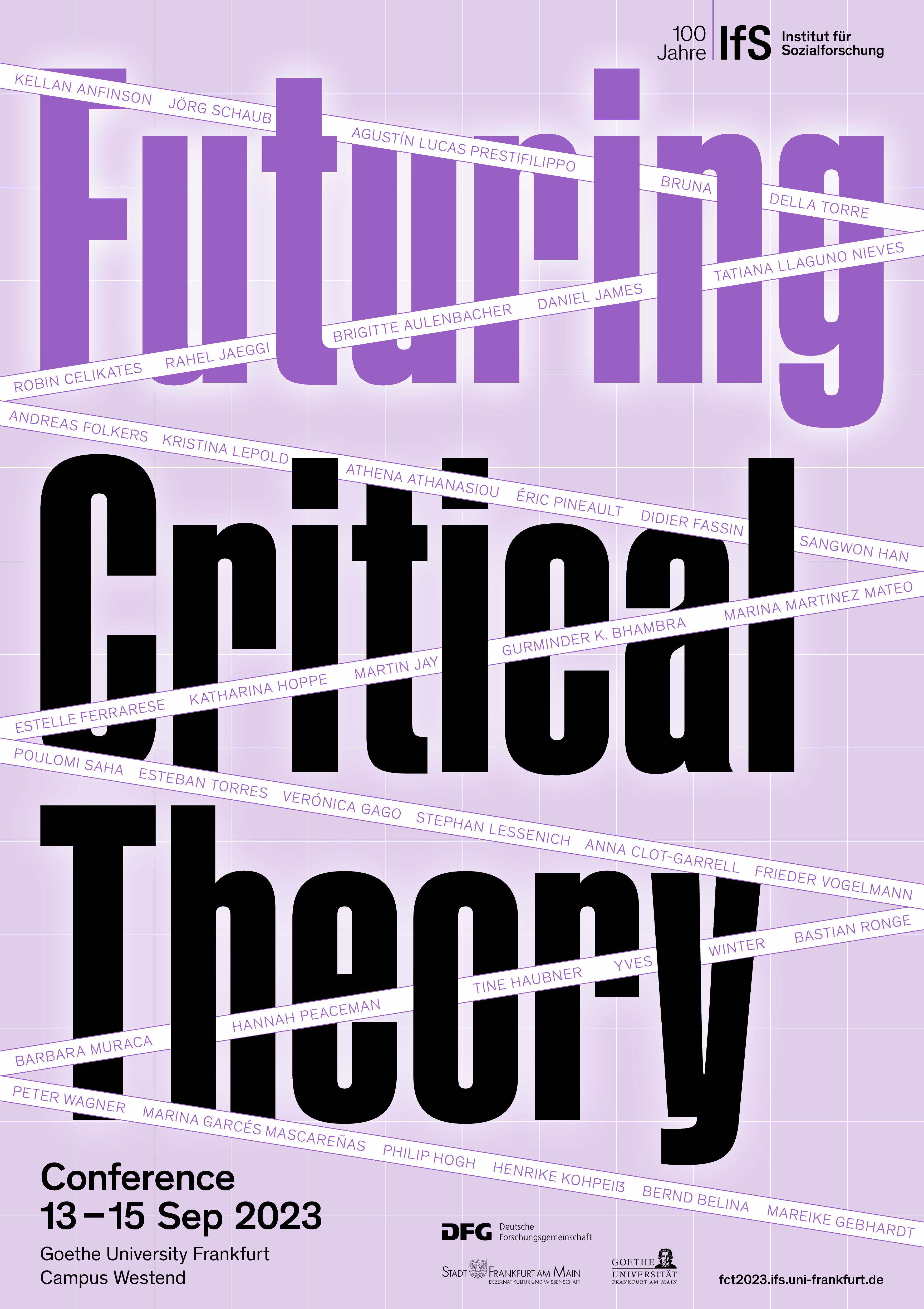Futuring Critical Theory
International Conference
13–15 September 2023, Frankfurt/Main, Germany
On the occasion of its 100th anniversary, the Institute for Social Research (IfS) is hosting the international conference »Futuring Critical Theory« at Goethe University Frankfurt on September 13–15, 2023.
The aim of the conference is to determine where Critical Theory stands and to reorient it in the light of the existential challenges of our times. In the course of recent academic and political debates on, for example, post- and de-colonialism, queer feminism and new materialism, several supposed certainties of Frankfurt School Critical Theory have in part been fundamentally challenged. Critical Theory has been put to the test on two fronts: On the one hand, the explanatory power of an approach that in its interpretation of crises has so far neither focused on the global interconnectedness of social phenomena nor on the material dimension of social reproduction has been called into question. On the other hand, it is debatable whether classical Critical Theory’s normative tools are still appropriate for theorizing contemporary social relations. To mark the IfS’s 100th anniversary, »Futuring Critical Theory« will be the place where the process of developing a new research program for the IfS comes to a preliminary conclusion and the program will be presented to a wider public for the first time.
The conference is facing the theoretical critiques and renewals of Critical Theory’s concepts in four sections: I Dissecting Critical Theory; II Globalizing Critical Theory; III Materializing Critical Theory; IV Recomposing Critical Theory.
Section I — Dissecting Critical Theory: The conference will be opened with an inventory of the conceptual repertoire of Critical Theory. How can the core of critical theorizing be preserved in radically changed (and changing) societies? Which concepts and perspectives have to be up- dated, which ones may have lost their analytical capacity?
Section II — Globalizing Critical Theory: For most of its history, Critical Theory has taken a strongly Euro-Atlantic perspective. What are the theoretical, normative, and practical implications of broadening and decentering the »criticaI gaze«? How can non-Western epistemologies contribute to a Critical Theory of global capitalism?
Section III — Materializing Critical Theory: The long, but often disregarded tradition of critical engagement with society’s relationships with nature has to take center stage in a Critical Theory for the 21st century. How should Critical Theory be adapted to make sense of the ecological contradictions of our time? Which changes are necessary if theoretical innovations such as New Materialism and critical Post-humanism or Transhumanism are to be taken seriously?
Section IV — Recomposing Critical Theory: The final section of the conference will be devoted to the question of how Critical Theory should be reconfigured in the light of the multiple crises we are currently witnessing. Do we need new answers — or do we have to pose different questions?
Futuring Critical Theory
Internationale Konferenz
13. bis 15. September 2023, Frankfurt am Main
Anlässlich seines 100-jährigen Bestehens veranstaltet das Institut für Sozialforschung die Internationale Konferenz »Futuring Critical Theory«, die vom 13. bis 15. September 2023 auf dem Campus Westend der Goethe-Universität Frankfurt am Main stattfinden wird.
Die Tagung zielt auf eine Standortbestimmung und Neuausrichtung kritischer Theoriebildung im Lichte der existenziellen Herausforderungen der Gegenwart. Einige vermeintliche Gewissheiten der Kritischen Theorie der Frankfurter Schule wurden in jüngerer Zeit, im Zuge wissenschaftlich-politischer Debatten etwa um Post- und De-Kolonialismus, Queer-Feminismus und Neuen Materialismus, teilweise grundlegend in Frage gestellt. Die damit einhergehende theoretische Bewährungsprobe ist daher eine doppelte: Auf dem Prüfstand steht einerseits die Erklärungskraft eines Ansatzes, der bislang weder die globale Vernetzung gesellschaftlicher Phänomene noch die stoffliche Dimension gesellschaftlicher Reproduktion in den Mittelpunkt seiner Krisendeutungen gestellt hat; zur Debatte steht andererseits, ob das normative Rüstzeug der klassischen Kritischen Theorie den gegenwärtigen gesellschaftlichen Verhältnissen noch gerecht werden kann. Zum 100-jährigen Jubiläum markiert »Futuring Critical Theory« den Ort, an welchem der Entwicklungsprozess eines neuen Forschungsprogramms des IfS seinen vorläufigen Abschluss findet und dieses erstmals einer breiteren Öffentlichkeit präsentiert wird.
Den drei Konferenztagen ist eine vierschrittige Prozesslogik zugrunde gelegt: I Dissecting Critical Theory; II Globalizing Critical Theory; III Materializing Critical Theory; IV Recomposing Critical Theory.
